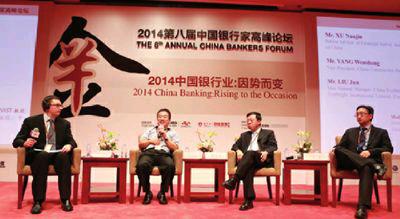CEIBS Eighth Annual China Bankers Forum
2014-10-23
New entrants in Chinas financial sector, such as Chinas Internet giants Baidu, Alibaba and Tencent, are introducing innovative online and mobile banking products and services that have transformed the industry. New policies such as interest rate liberalization are on the horizon. There is also a call to develop inclusive finance platforms that will help provide financial services to individuals and micro businesses in rural areas that are not currently being served by traditional banks. The new challenges this fast-changing business environment brings to traditional financial institutions and regulators were the starting point for discussions during the Eighth Annual China Bankers Forum organized by CEIBS and Economy and Nation Weekly held on September 13. The forum brought together experts on finance and economy as well as industry professionals. It was co-organized by the CEIBS Lujiazui Institute of International Finance.
In their welcome addresses, Zhang Weijiong, CEIBS Vice President and CoDean, and Wu Liang, Deputy Editor in Chief of Economy and Nation Weekly and Total Executor of Outlook Tank, introduced the themes for the days discussions. The talks revolved around the fast-growing reach of Internet finance, changes in consumer demand for financial products and services,inclusive finance and the concept of cocompetition, in which traditional financial institutions and Internet finance companies work together to leverage their unique advantages in order to accelerate development of the financial industry and benefit each other as well as consumers.
Zhu Min, Deputy Managing Director of the International Monetary Fund, gave a keynote address entitled The New Normal and Exiting UMP and Its Effect on the New Economy. The world economy is about to enter into uncharted territory, he said, as emerging market economies will have to begin adapting to monetary policy changes being instituted by the U.S. Federal Reserve. Emerging markets and developed markets are now becoming interdependent for the first time, and this kind of dynamic financial environment represents the shape of things to come. This will make it more difficult for emerging markets to adapt to changes in developed markets and vice versa, he claimed.
Creating a nurturing environment for interest rate liberalization in China was the theme of the keynote speech by Wu Xiaoling, Standing Committee member and Vice Chairwoman of the Financial and Economic Affairs Committee of the National Peoples Congress. She is also President of the CEIBS Lujiazui Institute of International Finance. She made the point that“liberalizing interest rates” does not simply mean moving to raise the ceiling on interest rates. Raising interest rates might make depositors happy, but it would mean banks would have to pass along their increased costs to borrowers, which would have a negative effect on the economy. Interest rate liberalization should be the natural result of institutional improvements that ensure banks and state-owned enterprises are more disciplined and that all market players can compete fairly. She also suggested that banks should focus on improving their services, including better management of wealth management products, and improving third-party payment services. This will enable them to stay competitive with Internet finance companies.
Xu Bin, a professor of economics and finance at the CEIBS, gave a keynote speech that focused on what China could learn from the experiences of other developing countries and regions including Latin America and South Korea that have already undergone the process of reforming their economies to be more open to market forces. The important takeaway for China, he said, is to take a long-term perspective and to understand that sometimes reforms result in short-term economic crises that end up leaving the economy in better shape for the long term.
The first session was entitled In the Times of Big Assets Management: The Third Reform in the Banking Sector. It was moderated by Henrik Cronqvist, Zhongkun Group Chair of Finance at CEIBS. Panelists explored how the banking sector can encourage innovation, particularly in the area of Internet finance, while at the same time provide reasonable risk control measures.
When introducing the panel for the sec- ond session, Bian Zhuodan, Editor in Chief of Economy and Nation Weekly, spoke about how the Internet has engendered disruptive innovations in many industries, not just the financial industry. Entitled Dialogue Between Internet Finance and Financial Internet: Competition and an All-Win Result, this session featured a discussion between regulators and senior executives from banks and Internet finance companies on how an oversight framework and co-competition between the players might be managed for the mutual benefit of all.
Xu Dingbo, CEIBS Associate Dean and Essilor Chair of Accounting Professor, led the discussions for the third session, which focused on developing a framework for inclusive finance in order to bring financial services to rural areas not served by traditional financial institutions. Speakers collectively made the point that inclusive finance is not simply about providing poverty relief or loans. As Xu Xueming, Vice President of Postal Savings Bank of China, explained, the current challenges for establishing an effective framework for inclusive finance mainly involve finding solutions for information asymmetry and the asymmetry between supply and demand, cost and return, and financial assets allocation, which have resulted in Chinas low income population and micro-businesses being denied access to financial services.
The day ended with a closing address by Pedro Nueno, CEIBS President and Chengwei Capital Professor of Entrepreneurship.
